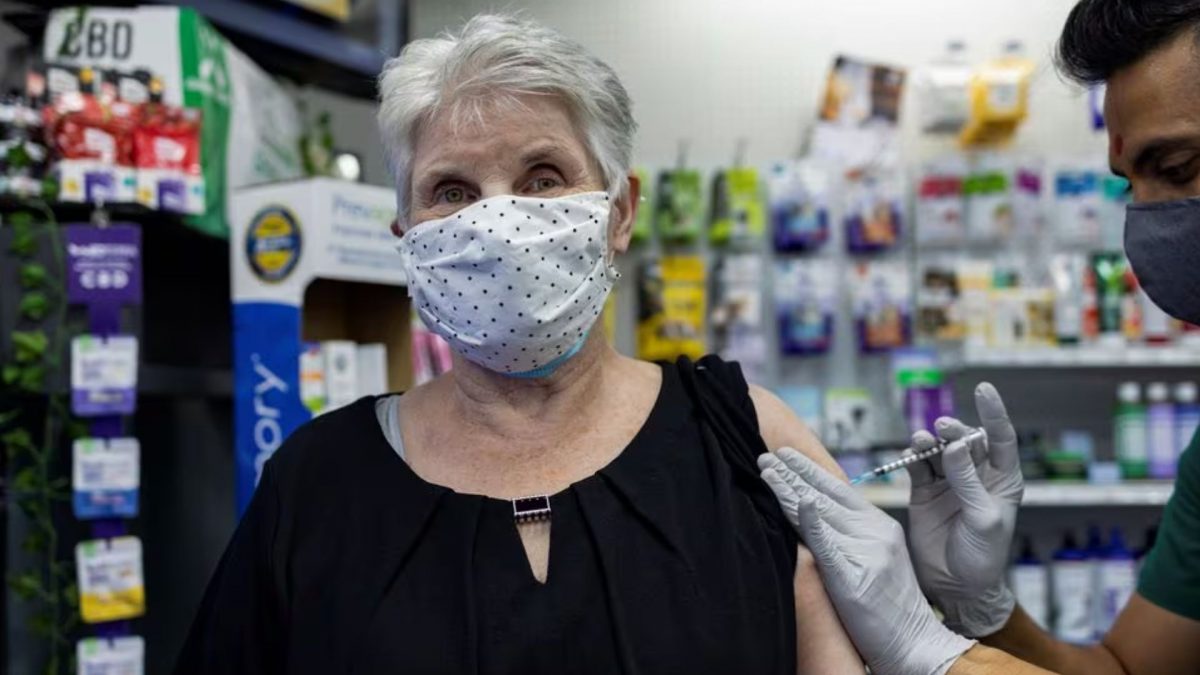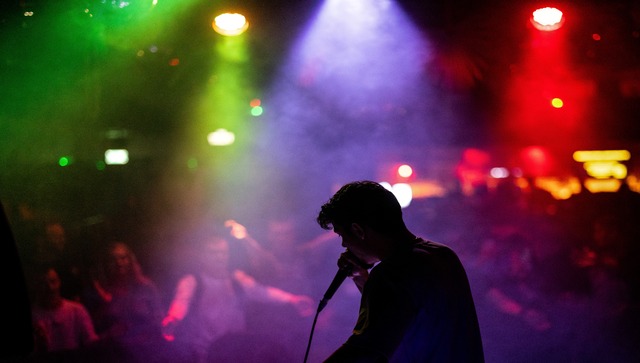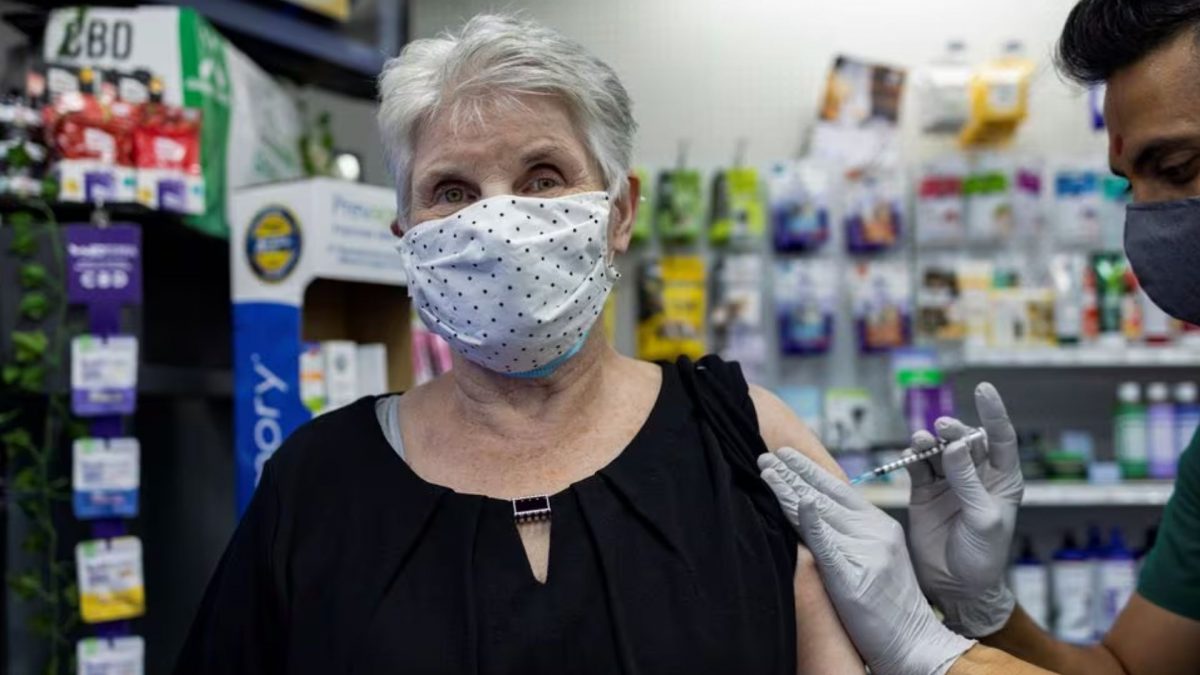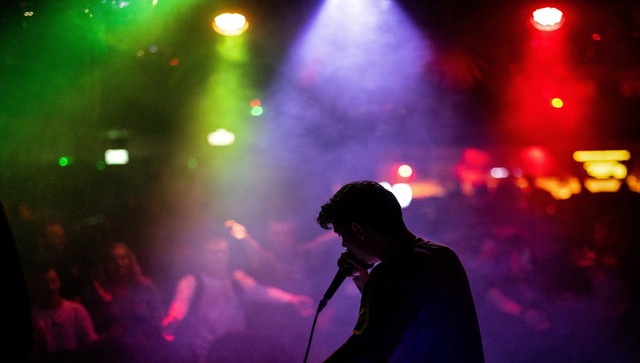Text by Joyona Medhi | Photographs by Abhishek Basu
The news of the nation-wide lockdown saw the city of Jamshedpur and its neighbouring villages adapting to and adopting different measures to keep the routine chugging-along of life going, albeit a little slower and limping in pace.
With a few bamboo poles tied together with unrelenting rope, makeshift grocery markets operating at particular times of the day — come rain, come shine — saw people dropping in to replenish their daily requirements, in fear of an uncertain tomorrow.
A portrait of my neighbour as we try to have a conversation while maintaining social distance.
When rumours of a few banks beginning their operations in full swing reached the ears of a handful in the industrial township of Tatanagar, the news spread like wildfire. The second phase of the lockdown saw never-ending queues, with varying gaps between people standing not so patiently, unable to hide their confusion about either their pensions, food grain limits, their dipping mutual fund investments, or practically everything left a little shaken by the government clampdown.
People visit makeshift markets to procure food for the lockdown.
However, the pandemic also brought to light the overlooked gears that turn the wheel called urban efficiency, whether it is the State or industry. Tagged “essential services”, they are among the few entities functioning during the lockdown. From security guards, who have not been allowed to go home for weeks, or are taking turns to do so every consecutive week, to nurses seen going from door to door to make note of travel histories — every morning in Jamshedpur sees these micro systems come to life.
A security guard in Jamshedpur, outside the main gate of the essential steel producing factory in the city.
In this environment, the work of those employed by the Tata corporation to look after sanitation is essential, whether it is spraying disinfectant on countless houses through the course of an entire afternoon, while being dressed in protective gear from head to toe, or cleaning clogged drains, since sanitation is not just a surface-level affair.
A man in protective gear employed to spray disinfectant on all the houses falling under the purview of the Tata Steel Company, as a basic precautionary measure against the virus.
Meanwhile, the frazzled public takes matter into its own hands. As meat shops remain largely shut, Iftekar Khan finds an ingenious way to deliver chicken right to his customers’ homes: he ties a bunch of them to the back of his scooter, and with his wooden carving knife and chopping board, goes from doorstep to doorstep. “Home delivery,” he says with a wink.
Bhola Ravidas with his wife and children, after returning to their hometown of Ravidas colony, Birsanagar.
Bhola Ravidas, his wife Rupali and their three children are now on Day 4 of their two-week home quarantine in Ravidas colony. Bhola reached his in-laws’ house in the Purulia district of West Bengal on 17 March. The announcement of the lockdown on 23 March left him stuck, helpless and accused of eating into another’s supplies. Armed with a doctor’s certificate stating that they are clear of the virus after a check up in Purulia, Bhola, his family and their cycle set out to walk roughly 100 kilometres, crossing state boundaries to reach home. Upon reaching here after a day-and-a-half, he was met suspicious eyes; eventually, people called the authorities. They tested negative again, and Rupali brandished the 14-day home quarantine certificate in front of my camera.
My Muslim neighbour says his evening prayer in the outdoors, right behind his home in Dhatkidih, Jamshedpur.
In the Muslim-majority neighbourhood of Dhatkidih, mosques continue to remain shut, even as the month of Ramazan begins.
People gather to buy food for their daily iftaar.
Makeshift fruit markets are set up in an empty playground for an hour every day, to serve the hungry stomachs of those who look forward to breaking their fast. While the world is further divided into binaries and marked by antagonism, Muslims fast and refrain from indulging in excess.
Under government schemes, there has been a supply of grains to ration shops in Birsanagar: 10 kilos of rice and one kilo of chana dal to be distributed for free to people with valid ration cards in Jharkhand.
The forgotten ones — those without ration cards — are left to be catered to by social welfare organisations or NGOs. In some neighbourhoods, the youth team up with these organisations to prepare three meals per day for the many who wait patiently in queue, within chalked-out circles, to ensure social distancing.
People queue up to receive portions of free food grains and public donations.
As there emerges a balance between the urge to lend a helping hand and take matters into one’s own hands, Sulochana from the mahila samiti at Birsanagar’s Ravidas colony makes face masks in bulk and distributes them for free to people who cannot afford to buy them.
Sulochana, a Mahila Samiti worker of Ravidas colony in Birsanagar, works deftly with her sewing machine.
I chance upon a temple priest who looks very annoyed, but I can’t tell if it’s because of the scorching sun or state of affairs. Upon asking, he explains that his ‘business’ has come to a grinding halt. No one is inviting him to perform rituals or pujas nowadays, he says. The god-fearing residents of Singhbhum district in Jharkhand seem to be paying heed to science rather than religion.
A priest in Dhatkidih, whose income has taken a hit since the lockdown.
The police continue patrolling the wide and empty roads, subjecting anyone violating social distancing and safety norms to punishment. I receive a notification about Jamshedpur’s first two positive COVID-19 cases in Chakulia. As the individuals are immediately transferred to TMH hospital and areas are sealed off, systems are predicted to get tighter, and the people tougher.
***
Banner image: Policemen doing their rounds to ensure people stay inside, cracking down on those who wander.


)




)
)
)
)
)
)
)
)